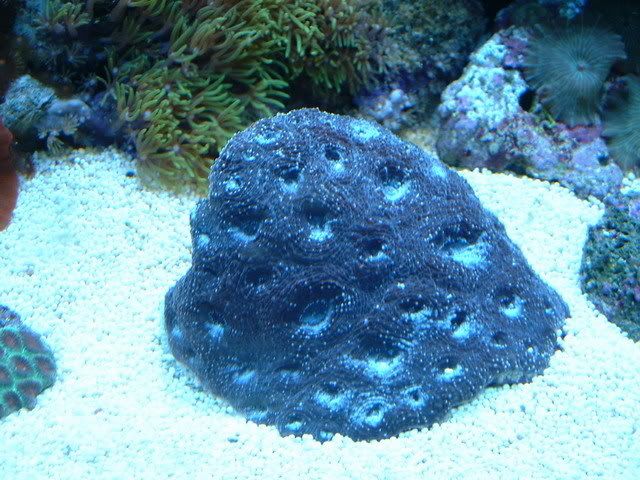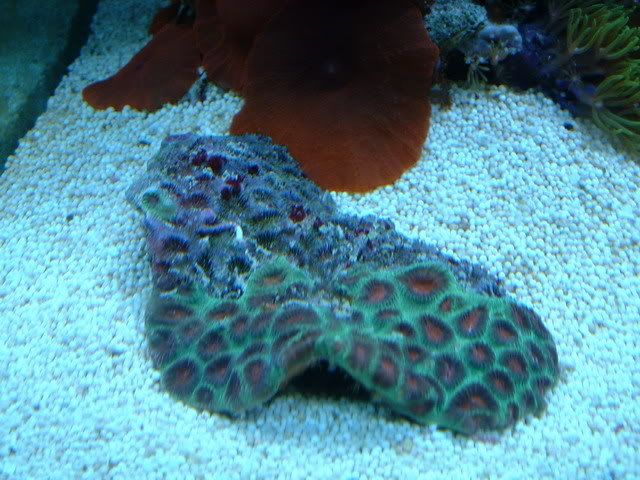

|
|
|
#1
|
|||
|
|||
|
Feeding corals
I LOVED your article...I have been target feeding all of my corals for years...one trick I found to be very helpful and keep from overfeeding the tank is this: After the food to be used is thawed out in water, I use a long pipette or Kent Sea Squirt to take some of the water only out of the container. DON'T use any food at this point, just the water that the food was thawed out in. I squirt it over the corals to be fed. It doesn't take a lot, just squirt some of the water onto the coral....usually within a couple of minutes you will see the coral expanding and putting it's feeding tentacles out. I allow them to fully extend, then I begin to feed them the mysis, oyster eggs or fish eggs. Their tentacles are already out, they quickly grab up the food and more of it. Hungry corals are already primed as it were and ready to eat, they responded rapidly when the actual food touches them and it doesn't allow the fish time to steal it away.
I have had rapid growth on all my corals and an increase in color. I find that feeding with this method allows me to feed at anytime of the day or night that's convienent for me and works extremely well with Sun Corals as they require target feeding anyway. I guess it's kind of like Pavlov's dogs but instead of ringing the dinner bell I just give them a hint of the goodies to come. Why not try this method and see how it works for you. I find I don't even have to go through the hassle of turning off the powerheads, feeding tentacles are "sticky" and hold the food just fine.
__________________
Join the fight to stop Puppy Mills...DON'T SHOP....ADOPT!!! |
|
#2
|
|||
|
|||
|
Thanks for the idea. I might try that. I often do something similar by placing a small amount of food on the coral first which prompts it to expand and then I feed the rest of the food.
Do you turn all pumps off before you squirt the "juice" on the corals or do you find that the water movement doesn't affect the corals reaction. How do you find you go with fish stealing from the corals?
__________________
ATJ |
|
#3
|
|||
|
|||
|
The time-lapsed slide shows were absolutely incredible! I usually TRY to make sure that my polyped animals get food during feeding times, but I will definitely target feed them well from now on.
Awesome article! Me and my corals thank you!
__________________
"DON'T @#!$% WITH THE JESUS!!!" ---The Big Lebowski--- |
|
#4
|
|||
|
|||
|
I do not have to turn off my pumps, but I suppose you could at the beginning to see how it works. I find that if you squirt food at the corals: # 1, they NEVER catch or eat the first pieces of food, it just alerts the fish and puts them into an aggressive feeding mood. By using just the water the food was thawed out in your corals are READY TO EAT by the time you go to feed them. #2 fully extended tentacles are sticky, lightly puff the food into the inner side of the tentacles, they quickly catch and respond to the presence of food. #3 I find a coral fed this way eats much quicker, thereby getting more of the food...and keeping fish from stealing it. #4 I find my corals sometimes extending their tentacles when I just feed my fish...it lets me know they are VERY hungry for some reason and when fully extended I feed them also.
The only time I turn off my protein skimmer and sump is when I'm feeding oyster eggs or fish roe...I keep the powerheads on to keep the water circulating within the confides of the tank...allowing all the corals and zoas to eat. I have even had SPS corals respond to this treatment. Sometimes I will feed during the day, sometimes I will wait until lights out and the moonlights come on...different SPS feed on different schedules. After their polyps extend, I use a sea squit to puff oyster eggs mixed with tank water to the SPS. You can see them respond. I have a radiator fluid green digi that went from a small 2 1/2 inch frag to the massive piece shown below in less than 18 months. Unfortunately, I sold that piece off when I broke down my large tank and didn't have enough foresight to save a frag for myself. (Here's where I start beating my head on the desk!) If you know anyone willing to sell me a frag of this, LMK.  This method works great for all corals...you might be surprised to see just how much a bubble, brain, chalice or acan will eat and grow. Good luck
__________________
Join the fight to stop Puppy Mills...DON'T SHOP....ADOPT!!! |
|
#5
|
|||
|
|||
|
Hi
Grate article… I wonder what method do you use in order to feed the corals? Do you gust spread the frozen food in the water or is there any target feeding method? Thanks |
|
#6
|
|||
|
|||
|
I target feed my corals with larger polyps, much like in the time lapse sequences. I generally do this with the powerheads off and after lights out (the latter more to stop fish from stealing the food).
For corals with smaller polyps (e.g. Acropora, Pocillopora), I put live Artemia nauplii (newly hatched brine shrimp) directly into the tank with powerheads on but lights out. The corals generally have their tentacles extended at this time and can catch the nauplii as required. I did try Ladipyg's food "juice" method yesterday in the middle of the day and got no noticeable reaction from the corals. The corals never react when I feed the fish, either.
__________________
ATJ |
|
#7
|
|||
|
|||
|
What kind of corals did you try it on? I'll try to get some pics of the response I get from mine, Acans, brains, bubbles, favia have all responded well. LMK if your interested.
__________________
Join the fight to stop Puppy Mills...DON'T SHOP....ADOPT!!! |
|
#8
|
|||
|
|||
|
Can you give me an idea of the best types of foods to use and an appropriate time to feed (in the dark under moonlight I assume?) my Acanthastrea sp. and Favia sp.? Do either of these types (pictures below) use photosynthesis for some of their requirements?
  Thanks
__________________
Excellence in reefkeeping is achieved by mastering the fundamentals, and learning from mistakes. |
|
#9
|
|||
|
|||
|
Ladipyg,
I specifically tried the "food juice" method with Tubastraea and Lobophyllia and saw no reaction to the "juice" in the water. My other tanks with fish effectively get "food juice" on a regular basis when I feed the fish and the corals don't appear to react. At the moment I'm happy to feed the way I do after lights out - and even with lights on in the tanks without fish. tlmack, You can use any meaty foods small enough to fit in the mouths of the corals. Things like mysids, minced prawn (shrimp), scallop or mussel, even minced fish would work well. Those corals have symbiotic algae and so photosynthesis does provide for some of their requirements. It must be remembered, however, that photosynthesis only provides energy and they still need food to survive long term. Photosynthesis basically provides sugar. How long would you survive on sugar alone?
__________________
ATJ |
|
#10
|
|||
|
|||
|
Hi. I tried feeding last night by turning off the powerheads after lights off and dropping some thawed out mysis on the corals with a turkey baster. I found it's difficult even with no flow to get the mysis positioned properly to lay on the corals. I saw the hint of some feeding tentacles but I'm not sure any of the few mysis were ever grabbed & consumed. Maybe the mysis are too lightweight to have them sink on to the Favia & Acan corals? That acan I have is a dome shape which also makes it difficult to place anything. I'll see if I can get any frozen or minced prawn, fish or scallop at the lfs - maybe those will sink and "stick" better than the mysis. Would frozen cyclops work any better than mysis or just as light weight?
Can I feed my Euphyllia sp. the same way with the same type meaty foods? Do I need to feed only after dark? Thanks again.
__________________
Excellence in reefkeeping is achieved by mastering the fundamentals, and learning from mistakes. |
|
#11
|
|||
|
|||
|
howften do you feed your corals?
|
|
#12
|
|||
|
|||
|
You do not add the "juice water" randomly to the tank. I use a Kent Sea Squirt to gently swish the water unto the corals...after their tentacles are out you go ahead and feed mysis, oyster eggs, etc. I have even made a thicker paste by adding a little Knox gelatin after it is dissolved in hot water and adding the mysis, oyster eggs, etc. to that. Grind up the items to be used in this mixture. Finer particles will not tempt fish as much and makes it easir for the corals to eat. Do not use so much gelatin that it thinkens as jello would. You want it more the the consistency of egg whites at room temperature. This will not happen until the gelatin cools. You cannot judge thickness while it is hot. Store in fridge but do not feed ice cold. Take out a bit and let it warm to room temperature. Using a pipette or a sea squirt you should be able to gently pipe it unto the coral. Works great for me. If I can find where I put my digital camera, I will take pictures.
__________________
Join the fight to stop Puppy Mills...DON'T SHOP....ADOPT!!! |
|
#13
|
|||
|
|||
|
tlmack,
I use mysids all the time and find they do get consumed but I get reactions like those in the article. If your corals haven't eaten for a while they may be lacking some energy and their reaction to food may have changed. Keep at it and you will eventually get some reaction. You only need to get a couple of polyps to feed to get things started. KBzreef, I would like to be feeding my corals every couple of days but as I have 8 tanks with corals that need to be fed, each coral is lucky to be fed once per week. ladipyg, I actually tried squirting the "food juice" directly on the corals with a turkey baster with no effect. My tanks do have a lot of water flow so I assume it was blown away from the corals very quickly. Maybe I should try with the powerheads off and see if I get a reaction.
__________________
ATJ |
|
|